Benchmarks: Internet Explorer 10 (IE10) vs. Google Chrome 18 vs. Firefox 11 vs. Opera 12
 After the previous benchmark results that tested the latest stable versions of web browsers, people expressed their interest in the beta or alpha build results as well. Well, today is your lucky day, folks.
After the previous benchmark results that tested the latest stable versions of web browsers, people expressed their interest in the beta or alpha build results as well. Well, today is your lucky day, folks.
Tested web browsers
Internet Explorer 10 (IE10) Platform Preview
Internet Explorer 10 (IE10) Metro Platform Preview
Google Chrome 18 Beta
Firefox 11 Beta 5
Opera 12 Alpha
What’s the difference between Metro and Desktop IE? As mentioned earlier, “IE Metro (aka Immersive web browser) uses the 64 bit libraries by default.”
Benchmark results
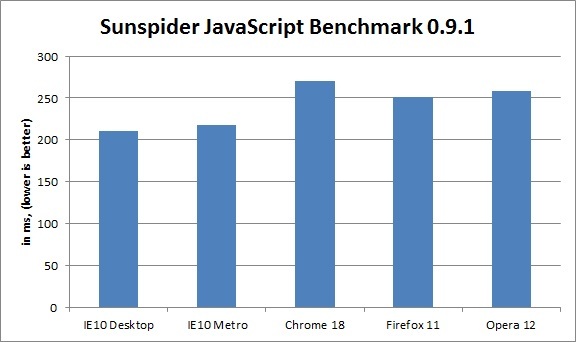
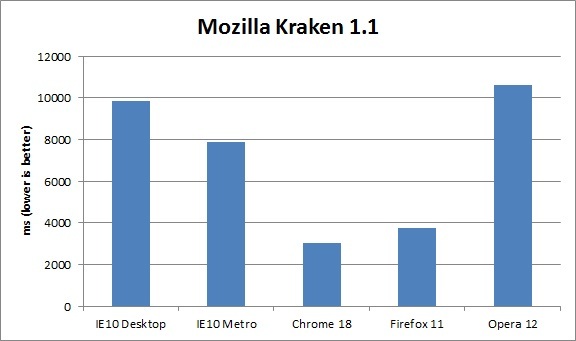
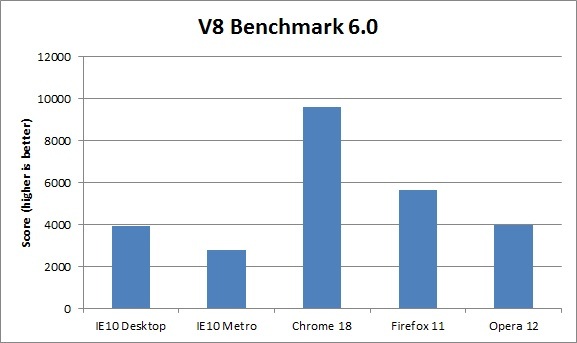
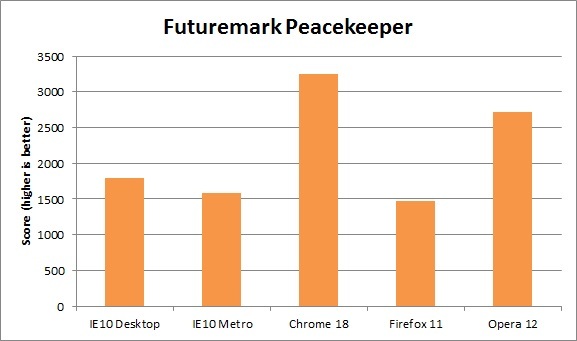
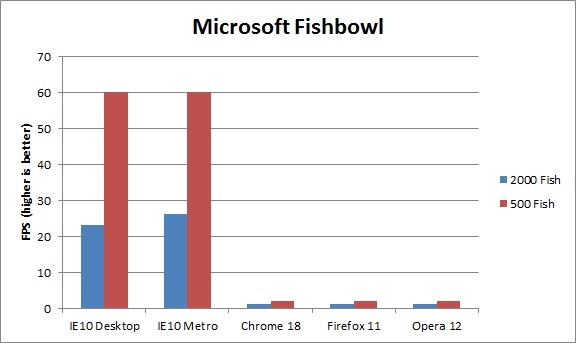
To sum it up from this small run, there is no distinct winner. All web browsers trade blows at each other and the ultimate user experience depends on your daily usage requirements.
Want even more details? We encourage you to check the following post.
About (Author Profile)
Vygantas is a former web designer whose projects are used by companies such as AMD, NVIDIA and departed Westood Studios. Being passionate about software, Vygantas began his journalism career back in 2007 when he founded FavBrowser.com. Having said that, he is also an adrenaline junkie who enjoys good books, fitness activities and Forex trading.




Can not understand WHY DO YOU USE BENCHMARKS WITH 60 FPS CAP???
Ahh man do I have to spell it out to you again? He did not. I repeat: DID NOT!! do these tests.
Thus he cannot change anything. PLEASE HAVE A LOOK.
And that is good reason to not repost it all over the web!
There is enough confusion about relative browser capabilities without adding so called “benchmarks” to the mix.
There’s a good reason why animations in the browser are capped at 60fps. Most computer monitors run at 60MHz, so refreshing your animation more than that causes frames to be drawn between screen draws. Which cause jumpy animations. There’s even an experimental feature in the mix to only allow drawing between frames (read more here https://developer.mozilla.org/en/DOM/window.requestAnimationFrame).
Just 60Hz. There’s isn’t an old Pentium in there, is there? :P
Clarification:
“Just 60MHz. There’s isn’t an old Pentium in there, is there? :P”
^
Hertz are still relevant.
He said monitors run at 60MHz. They run at 60Hz.
And I said hertz are still relevant.
I know he made a mistake I was highlighting it.
My bad. You were replying to me so I thought that was for me.
Why it is important to disregard the frame cap?:
1. It shows the true potential of a piece of software to penetrate the hardware level and use it as acceleration.
2. Scalability. In the sense of bumping up resolution and post effects. See that 60 frames would seem insignificant. But when you bump up ‘eye candy’ if you will, you evidently lose performance. That browser at 60 frames now will not work so hot when it struggles whereas that other browser displaying 60 frames yet later is pushed and can take advantage of the OS functions will do much better as it was running the test at 80 frames but the extra rendering was disregarded by the monitor.
Although this might not seem practical, it does allow us to see what the product is capable of.
So it is ALWAYS better to have more performance than needed because it FUTURE PROOFS the product and thus justifies purchase.
Negative, Sir!
Benchmarks are here to test MAXIMAL performance! So no Caps allowed!!!
Caps are opposite of what real benchmarks do.
You do reliease that it is just a browser right?
Maybe the whole OS is going to be browser based and the masses will use it. Till then, no one is going to use high-end tasks in browsers (not the majority)
Is smooth experience with Gmail a high-end task?
3 opened tabs with heavy JS web apps is high-end task?
(like twitter.com and facebook.com and gmail.com :D check about:memory in FF to see how much JS and data they produce !!)
Reall time data presentation by presenting them in animated form is high-end task?
Anyway, benchmarks are meant to be STRESSFUL for given solution. MS Fishbowl is not. It have limit at 60fps.
And it is important!
You can imagine some data presentation forms that are interactive and would suite web pages, right?
Fishbowl is just a toy really, but there is plethora of use cases for animated data presentation, in real time! (If its not real time then simple video is better).
Fishbowl could at least benchmark. But it is not benchmarking. Its showcasing usage of HTML5 related techs.
So it should not be used as benchmark, hence my comment, to which you have replayed.
Are we talking about web applications or web __benchmarks__ ???
It’s irrelevant. That result is completely dependent on the computer hardware. If you use IE10 on a 10 year old computer, you won’t get 60 FPS, anyway. If they show that you can get 156 FPS on a high end computer – what does that prove? Nothing, other than the fact that they used a good computer.
Therefore the 60 FPS cap.
1) Benchmarks ARE testing extreme cases.
2) Benchmarks predate need for “power”, but never for long.
3) Benchmarks predate new ways of using this “power”.
4) Benchmarks often point to weak points of objects they test. So we can see which one is good/bad at what.
5) Games never have enough power.
And again what is the point of benchmark when it is not measuring ANYTHING?
I can get 60 fps in opera 12 latest build. if you are using older display card, it disabled by default.
Firefox, Chrome and Opera run better than that. V, what video drivers are you using?
According to bench mark chrome is better.User will take the browser according to their requirements..
Benchmark done by a kid! You need to enable hardware acceleration in Firefox to get 60fps at benchmarks.
“To clarify: default settings were used across all
browsers […] if it was disabled because an end-user would not
know to enable this when trying the browser, and would luck out in terms
of performance gains.”
Is what they said. Though, it doesn’t make much sense. using this very reason they should simply drop testing other browsers, seeing how more than 50-70% (depending on statistics-sites) of the users use IE for browsing, witch means many end-users doesn’t know about alternative browsers either.
They especially wouldn’t know about how to use beta software. The guy who did this benchmark is pretty dumb.
“Benchmark” could be ok if it was tagged properly.
Like “quick and dirty comparision” or something similar.
However it’s much worse that others copy it all over web :(
Hardware acceleration is enabled by default if FF discover workable mix of gpu and drivers, for very long time.
For ordinary user it happens automagicaly.
If you do not have good GPU or good drivers, then you do not have good GPU or good drivers. No web browsers will change it for you ;)
You should use hardware acceleration for all browsers (Firefox have some tweaks in about:config and it’s the best in Fishbowl test). Don’t you believe it?
http://s12.postimage.org/5zdn9pawb/500_fish.png
http://s7.postimage.org/6nnn5bik9/2000_fish.png
These pics are 100% real. ;)
Azure should render (word play ;) ) about:config tweaks no longer needed!
Just out of curiosity, what type of computer were used for those tests? My computer isn’t all that great, but here are the results for fishbowl on chrome:
500: http://i.imgur.com/o3lEq.jpg
2000: http://i.imgur.com/eWkEn.jpg
If you enable GPU acceleration Chrome is faster than IE10 @ Fish Bowl, however Chrome uses more CPU.